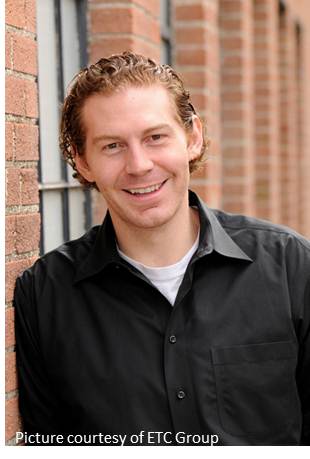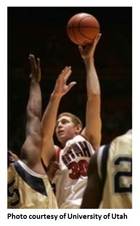
Name Chris Jackson
- Education MBA, University of UT 2007; B.S. Chemical Engineering, University of UT, 2005
- Target Audience Undergraduate

For Chris Jackson, living large is about more than standing 7' feet tall. Living large is also about educating yourself and caring for the environment by reducing consumption and energy use. Read more to find out what makes the Chris's energy engineering work so cool!
Although Chris's undergraduate education is in chemical engineering, he is currently working in a mechanical engineering capacity. As a Professional Engineer with a LEED (Leadership in Energy and Environmental Design) Engineer Accreditation at ETC Group, Chris does mechanical engineering work that focuses on energy efficiency consulting for commercial, institutional and industrial businesses. His company aims to help their clients reduce the impact of energy use on the environment through engineering, analysis, education and advocacy. Energy efficiency work can be done with existing structures through equipment upgrades or modifications or pre-construction by looking through building plans to figure out what changes can be made to increase efficiency and reduce impact to the environment. Energy efficient engineering is not always about wearing hard hats and doing field work, you must be equally adept at spending time in the office building models, writing reports and meeting with clients. Having an MBA has also proven to be quite valuable when meeting with clients. In addition to understanding the engineering needs of his clients, he also understands their bottom line, budgeting and finances.
For Chris, every day brings something new, and his daily duties depend on what projects are in the pipeline at the time. He gets to do a lot of traveling to meet with clients and scope out project sites. Right now, he is involved with several projects in Phoenix, AZ so he is there at least once a month. "I enjoy traveling, doing field work, and developing solutions to problems, but it's also important make accurate calculations and effectively communicate your ideas" Chris explains.
Doing something that is environmentally responsible is important to Chris personally and professionally. "The best part is seeing the impact on client's energy bills after guiding projects through to completion," Chris explains. Energy efficiency engineering doesn't solve all the environmental problems we are facing, but it's an important step in reducing our impact to the planet. There is still so much to be done, but we're moving in the right direction.
You may have heard the phrase It Takes a Village Raise a Child, and the place where Chris grew up, Los Alamos, NM, is well described by such a phrase. The scientific community of Los Alamos sparked his interest in engineering. Los Alamos is the site of the world famous Manhattan Project, which culminated in development of the first atomic weapon in 1945. This project transitioned into the establishment of the Los Alamos National Laboratory (LANL), where his father works as an engineer. In fact, a large portion of Los Alamos's residents work at LANL. Becoming an engineer seemed inevitable for Chris.
Living in Los Alamos seemed to have its benefits in terms of gaining an early introduction to science and engineering. Chris maintains that, "Los Alamos was a very interesting place to grow up." Chris explained that in the Los Alamos public high school many of the science and math classes were taught by engineers or physicists with high-level degrees. Not only did Chris take AP calculus and chemistry as a junior, he also took AP statistics as a senior in high school.
"It was in high school" Chris confirms. He believes that most kids know in high school if they are going to pursue a STEM field because you have to start thinking about what classes you need under your belt to get into an engineering program in college. Not to say that some kids don't switch majors in college - we all know that happens too. However, undergraduate engineering courses can be easier if you have a strong science and math foundation by the time you finish high school. His SAT scores also reinforced what he already knew. He did well on the English portions, but really well on the science and math sections.
According to Chris, it was definitely being an athlete. He had a full basketball scholarship to play at the University of Utah. Chris practiced every day, was on the road traveling with the team and had to make tough choices about his social life. The first few years of college were not too difficult for Chris because of all of his AP classes and strong science and math background, but as a junior and senior when he was doing Calculus III equations school became more rigorous. "Balancing basketball and school work was pretty rough at times" Chris explains, "the schedule almost forces you to manage time effectively in order to get by." Chris is fortunate that he learned time-management and prioritization skills in school because it has helped him in his professional career.
play at the University of Utah. Chris practiced every day, was on the road traveling with the team and had to make tough choices about his social life. The first few years of college were not too difficult for Chris because of all of his AP classes and strong science and math background, but as a junior and senior when he was doing Calculus III equations school became more rigorous. "Balancing basketball and school work was pretty rough at times" Chris explains, "the schedule almost forces you to manage time effectively in order to get by." Chris is fortunate that he learned time-management and prioritization skills in school because it has helped him in his professional career.
His family was supportive of all his endeavors, but seeing the important work his dad was doing at LANL really inspired Chris. Once he got to college his coach and professors were all supportive and accommodating of his dual athletic/academic career. His professors backed Chris by allowing him to miss class if he was traveling with the team as long as he kept up with his work. His basketball coach also played a big part in ensuring he was successful on and off the court.
Internships are important, especially if you are trying to decide what type of engineering you want to go in to. "I had summer internships in a few different laboratories," Chris explains. One summer I was testing products at an asphalt sealant manufacturing company. The next year I worked with a chemical engineering professor at the University of Utah on his acid mine drainage research. For two summers I worked at the lab (LANL) helping to develop chemical reaction models for metal refinement".
Engineers with all levels of education are needed in the work force right now. "My company hires engineers, analysts, and technicians with associate degrees, bachelor degrees and with higher degrees," Chris explains. If you are going into research, then a PhD is important, but don't discount an undergraduate engineering degree or even coupling that with a master's in business, which has given Chris a unique edge.
There is a huge push to make everything more efficient. The cost of energy and water are rising. Any field that deals with sustainability and conservation will only be growing in the future. "It makes a lot of sense for businesses to start out with energy efficiency to reduce their energy needs before moving on to meet those needs with more expensive renewables like solar and wind."
Energy Efficiency - Using less energy to provide the same products and service
(adapted from Dictionary.com)
Why did you choose your major? Did you always know this is what you wan…
Lisa Ingham excels on the field and in the classroom as an Engineering …
Why did you choose your major? Did you always know this is what you wan…